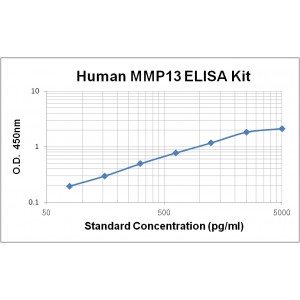More info
Assay Range | 78 - 5,000 pg/mL |
Sensitivity | 5.0 pg/mL |
Size | 96T |
Storage | Store at 2 - 8ºC. Keep reconstituted standard and detection Ab at -20 ºC |
Assay Principle | Sandwich ELISA |
Sample Volume | 100 µL final volume, dilution factor varies on samples |
Detection Method | Chromogenic |
Kit Components
1. Recombinant Human MMP13 standard: 2 vials
2. One 96-well plate coated with Human MMP13 Ab
3. Sample diluent buffer: 12 mL - 1
4. Detection antibody: 130 µL, dilution 1:100
5. Streptavidin-HRP: 130 µL, dilution 1:100
6. Antibody diluent buffer: 12 mL x1
7. Streptavidin-HRP diluent buffer: 12 mL x1
8. TMB developing agent: 10 mL x1
9. Stop solution: 10 mL x1
10. Washing solution (20x): 25 mL x1
Background
Matrix metalloproteinase-13 (MMP-13), also known as Collagenase 3, is a member of the matrix metalloproteinases (MMPs) family belonging to the zinc and calcium dependent endopeptidase superfamily. Matrix Metalloproteinases (MMPs), also called Matrixins, plays an important role in the degradation of the extracellular matrix which is involved in a series of physiological processes related to embryonic development, morphogenesis, and tissue remodeling. MMPs have also been implicated in the pathogenesis of many diseases such as arthritis, cancer and cardiovascular disease. Human MMP-13 is secreted as a 452 amino acid (aa) proenzyme (pro-MMP-13) composed of an 84 aa N-terminal propeptide and a 328aa mature protein. The N-terminal propeptide consisting of the cysteine switch motif conserved in MMPs that keeps MMP-13 in an inactive state can be removed from the pro-MMP-13 by MMP-2, MMP-14, and plasmin. The mature MMP-13 protein contains a catalytic domain with a zinc-binding motif conserved in metzincins. MMP-13 can degrade type I, III, IV, IX, X and XIV collagens as well as fibronectin.


